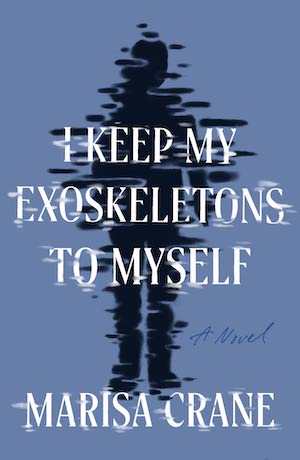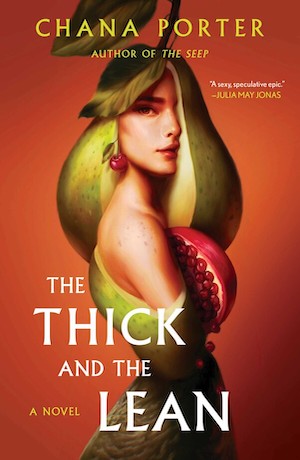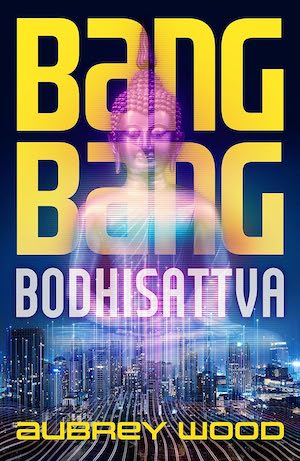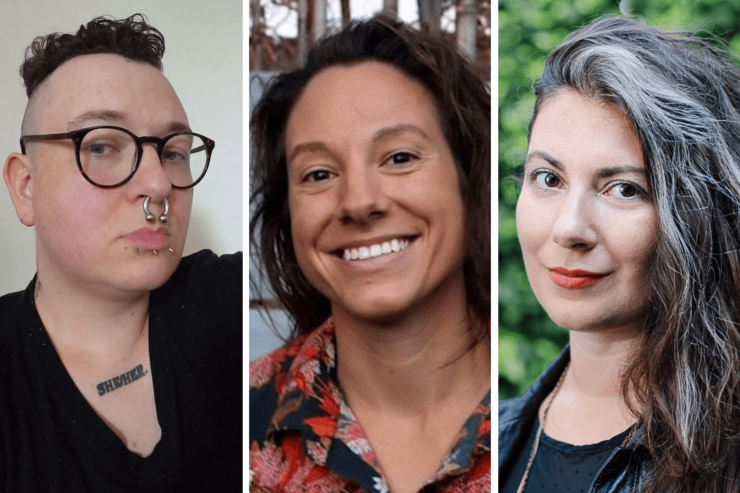A fractured, delicate story of parenting and family in a surveillance state; a comic cyberpunk noir adventure; a picaresque fantasy about forbidden desire and colonialism; a mecha adventure about collapsing faith and collapsing culture. All of them are queer as hell, and have their queerness woven into their worlds and voices, and all of them are finalists for 2024’s Lambda Literary Award for Speculative Fiction, which will be announced tonight.
We’re so excited to share this interview with Mac Crane, author of I Keep My Exoskeletons to Myself, Aubrey Wood, author of Bang Bang Bodhisattva, and Chana Porter, author of The Thick and the Lean. The other two finalists—Emma Mieko Candon for The Archive Undying and Vajra Chandrasekera for The Saint of Bright Doors—did not participate in the interview—Their books are fabulous and you should check them out.
We want to note that many of the finalists have chosen to add their names to a statement on what they see as the Lambda Awards organization’s inadequate response to ongoing violence in Palestine—particularly calling attention to the practice of “pinkwashing”; you can read their full statement here.
Now on with the interview.
Leah Schnelbach: When you first start a new work, does it begin with a voice, an image, a scent, an idea, a plot outline—or some other element entirely?
Marisa (Mac) Crane: For me, it really depends on the piece, what it demands, and where the idea comes from. I Keep My Exoskeletons to Myself came from two different elements: a poem fragment I’d written years before and a first line that randomly came to me that wouldn’t leave me alone: “The kid is born with two shadows.” My forthcoming novel, A Sharp Endless Need, began with a combination of voice/character and themes I wanted to interrogate—queer desire, sports as sex, the violence of self-denial, and beyond.
Aubrey Wood: I have more story ideas than I have energy budget to pump them out so a lot of them sit up there percolating for a long time before I start, and they will gradually collect scenes I want to do, vibes, story elements I want to hit–I write a lot of things down as loose notes which I think of as the concept stage–and I usually get started on something when a really good opener comes to me because I like to write in sequence. Bang Bang started because I got on ritalin and suddenly a bunch of extremely loose vibes I had had floating around for years for a cyberpunk story came together at about 2-3k words a day over like four months; conversely right now I find myself with a backed up queue, taking notes and taking things down from the shelf as I have time to get to them.
Chana Porter: All my writing impulses are different but The Thick and The Lean began with a pretty classic SF trope of the taboo switch: What if there was a culture where sexual pleasure was public and mundane and food pleasure was highly taboo? I thought I was writing a pithy short story or novella, but I keep pulling the thread of body autonomy, particularly around desire and societal expectation for teenage girls and women, and the world grew and grew.
LS: In each of your books you’ve created intricate alternate societies that comment on our world–in some cases homophobia is very much a part of your fictional society, in other cases taboos around sexuality have been replaced with taboos around food. I think each book grapples with issues of class and climate destruction. How did you begin creating these worlds? How did you decide what to keep from our own world, and how to tweak certain things to create your commentary?
MC: I’ve always been really interested in shame, guilt, and the punitive impulses of our society, so those elements were what I wanted to highlight and explore in I Keep My Exoskeletons to Myself. At its core, it’s a prison abolitionist book, a book about how shame and punishment are the very antithesis of healing and growth, and a book condemning our society’s obsession with surveillance, punishment, and the labeling of “criminals.” This book was partially inspired by a self-directed, self-shaming poem I wrote when I was very young and trying to figure out how to be a person who didn’t hurt people. It said something like “If the shadows of everyone you’ve ever hurt followed you around, day in and day out, would you still be so reckless with people’s hearts?” And thus, the world of my book was born: a society in which prisons have been abolished but “criminals” are punished with a permanent extra shadow for each crime they commit—a mark of shame and a warning to others.
AW: In creating a queer and in particular transgender-driven cyberpunk near-future narrative I wanted to make a world where exploring the canvas of gender was far more normalized, but not a piece of escapism where bigotry didn’t still exist. The world in Bang Bang is intended as an accelerated mirror of our own, born of the anxieties of a society falling into fascism and the fear of a soon-unlivable planet. It turns out that in much the same way as Neuromancer was William Gibson’s optimistic prediction of a world that had not been destroyed by nuclear war, the arc of the years between when I wrote Bang Bang and its publication have outpaced even my 2019 cynicism.
CP: As I kept following the food/sex taboo switch, I discovered how it impacted every layer of society, to what people watched on television, advertising, church dogma, even architecture. The bizarro mirror world of The Thick and The Lean became a lens to contemplate our own reality’s relationship to not only body image and eating disorders, but how often cults/organized religion use perfection/mastery of the body as a form of social control. Then the book begged the question: how did it become this way? The worldbuilding centered around colonialism, indigenous land rights, governments vested in corporate interests, Big Agriculture. It asked—who grows our food? What does food deprivation look like for a wealthy person (juice cleanses, enemas, supplements) versus someone who is actually food insecure? The book follows 3 main characters, with a braided narrative—big structure, big ideas!
LS: What was the element of worldbuilding you found most difficult?
MC: I’m not naturally great at worldbuilding—I’m more of a voice-driven and psychology-driven writer—so the entire notion of creating an alternate world was a bit daunting for me. But I was committed to doing it, to fighting my, at times, self-defeating attitude to craft a book that felt true, in every sense of the word. True as in reflective of our society and its horrors. True as in having an honest, unflinching heart. True as in unafraid of tackling difficult, traumatic themes.
AW: Writing cyberpunk in a world where we elected a game show host president and all happily carry a mass surveillance device around in our pockets may seem utterly redundant. Going back and reading classics of the genre I find myself still being taken to school and catching up to their fierce and acerbic predictions. What I was trying to do, I realized, was not necessarily predict the future but shine a harsh light on the present; while I do imagine a near-future scenario, I think my intent is to interrogate people to look at our present and ask if they find it acceptable.
CP: I really love world building. Harrowing, but difficult in a fun way, like climbing a mountain. The Thick and The Lean was essentially built backwards. It began with Beatrice’s narrative which closely explores body image and eating disorders through the lens of a restrictive cult. This was extremely personal to me, a way to talk about growing up in ‘90s diet culture in suburbia, where I felt like the most important thing I could contribute to society was my beauty, and I felt alienated from my own desire as a queer person. What did I even want? It took me years to figure that out. Then I zoomed out: How did this religion come to be? How is it similar and different to the larger world? Structurally braiding the three narratives, two in the present timeline and one 1000 years in the past, in the form of a banned cookbook/memoir—that was most difficult.
LS: These are four very thoughtful, idea-driven books. How did working in speculative fiction shape how you tackled your ideas?
MC: I really love speculative fiction for the ways in which it allows us to create enough of a remove or distance from our society so as to actually allow us to get closer to the heart of the issues. I think this is especially true for readers who may be resistant to acknowledging or admitting the full scope of the oppressive nature of our society. Or rather, they’re unable to imagine a world in which things are different, better, because they’re so committed to the way things have always been—such as with incarceration. So often, I speak to people who are like, “Yeah, I see how the prison industrial complex is violent and not the best solution, but what else are we supposed to do with criminals?” And they think this way because it’s all they’ve ever known and because perhaps the PIC hasn’t affected them or touched their lives in a very real way. But when a speculative novel holds a mirror up to the cycle of recidivism and the violence perpetuated by the state using a different conceit? You just might get some more people to pay attention. And that’s what’s so dope about this genre.
AW: As Marisa says above, spec fic is wonderful for its predisposition for social commentary; but it is also often criticized for defaulting to allegory instead of more closely depicting oppressive structures. I wanted a cyberpunk story that said “this is already happening”. These are real trans people, this is real police violence, this is real racism. I feel you can have androids fighting for personhood as a loose allegory for minorities and also depict real minorities still facing those problems.
CP: I keep returning to speculative fiction because I think the frame of What If helps us see our own world more clearly. Capitalism isn’t natural—it’s a frame, it’s a choice. Inhabiting an SFF world where different choices were made helps us see the seams, the bricks, of our own world. We made these choices, we can choose something different.
LS: Are there any specific speculative works that you looked to for inspiration as you wrote?
MC: Oh, yeah, so many: 1984, The Handmaid’s Tale (with the understanding that it is flawed), The Giver, Parable of the Sower, Never Let Me Go, and Do Androids Dream of Electric Sheep? Though it’s not speculative, The Scarlet Letter and its exploration of shame, ostracization, isolation, and justice had a huge influence on this novel.
AW: Shout out to Trouble and Her Friends, a previous Lambda winner; Virtual Light (my favorite Gibson, for my money); Pat Cadigan’s Synners; A Scanner Darkly, one of my favorite books ever and the movie which informed a lot of my aesthetic; Terminator 2: Judgment Day; and Samuel Delany’s Dhalgren which will basically always play the role of the Whiplash music teacher in the back of my brain.
CP: I love a lot of the books mentioned above! And some I’ll have to go out and read. Le Guin and Butler are always important to me, especially when thinking about anthropological/political world building. In terms of writing on the body, I devoured Melisa Broder’s Milk Fed, Sarah Rose Etter’s The Book of X, Dietland by Sarai Walker. Braiding Sweetgrass by Robin Wall Kimmerer was influential for thinking about indigenous farming practices. I also loved reading this book on English gardening from the ‘90s— A Gentle Plea For Chaos by Mirabel Osler. Her words begin The Thick and The Lean. I read these years into writing The Thick and The Lean. My two cents: If you hear of a book exploring similar themes, I think it’s best to save it until you’re well into your project. I don’t actually read much fiction when I’m drafting, only when I’m editing. Don’t want too many cooks in the kitchen.
LS: What was the book that first made you a reader, and the book that first inspired you to be a writer? (Assuming those are different books, maybe they’re not!)
MC: I can’t remember a first book specifically that made me a reader but my first obsession was Nancy Drew and the Hardy Boys. I wouldn’t put those books down for anything. My mom used to bring me lunch in my room because I’d spend an entire Sunday locked away reading them and forget to eat. I can’t pinpoint a book that made me want to be a writer because as long as I can remember, the desire was always there. I know when I was six years old, I told my parents I was going to be a WNBA player and an author—and thankfully, the latter isn’t affected by my being a short king (can I do that, call myself a short king? Ah well…).
AW: This is a tough one because I have written basically my entire life–I made picture books as a kid, I wrote fanfic as a teenager–but starting the manuscript that eventually launched my serious attempt to become a writer was kind of an accident and it preceded the decision to seriously get back into reading (the rationale being if I’m going to do this, I’m going to do it right). As a kid I loved Animorphs and typical young adult fare, and had a fixation on newspaper comic strips; I was extremely good at English class but wasn’t much better read than the average kid despite my propensity for writing. A Scanner Darkly, when I was in my late teens, was the first adult book I really remember seeking out for myself. Once I decided I was going to make a serious attempt at writing again in my early twenties, there was a one-two punch of reading Light by M. John Harrison and American Gods by Neil Gaiman; I especially remember the former, with its dense prose, feeling like a thick porterhouse steak for my undeveloped brain. The intellectual and emotional experiences of those two books one after the other set a bar for me in those early days that struck me with a reinvigorated passion for the craft.
CP: I found Octavia Butler’s Dawn in a public library as a teenager, and it changed my life. I was a big SFF reader then, but Butler showed me that I might be a writer, too.
LS: What was the first queer media you found—or maybe the first that you felt saw you or loved you? (For example, for me I think it was Angels in America, which set a certain template for how to talk about BIG QUESTIONS with queerness built into them. It also made me really longwinded.)
MC: I remember not even realizing that there were books about queer people until I got to college. My education left much to be desired in the form of exposure to different types of books, books that might have saved me a lot of depression and despair. And I think I was too busy typing “Am I gay quiz” into Ask Jeeves or something in order to realize I could use the internet for things like gay books. But I made a habit out of subconsciously queering anything I watched throughout my childhood and adolescence: Boy Meets World (I wanted to be Shawn Hunter), Rocket Power (I wanted to be Reggie and Otto at the same time), She’s the Man, and Disney Channel Original movies like Motocrossed, Brink, and The Thirteenth Year (trans allegory if I ever saw one). I suppose that doesn’t answer your question. I think the first queer media I ever encountered was The Miseducation of Cameron Post when I was 18, followed by Annie on My Mind, which a lesbian lent me. I was like—what? You can write and read books about lesbians?
AW: The first Life is Strange game turned me gay. There’s a scene where high-school age Chloe and Max are hanging out in a bedroom listening to music and doing teenager shit and they get on the bed and take a polaroid selfie together and I was blasted with an atomic-force blast of yearning for a youth that I didn’t have and I remember thinking “Fuck. I want to be a girl, don’t I?” I still didn’t do anything about it for three more years but a lot of things–my fascination with The L Word, why I only seemed to date bisexual women and closeted trans men, why I always leapt at any excuse to dress in drag–began to make sense.
CP: What a great question. I would wander around my town’s public library and just pull books off the shelves, so the first queer book I remember reading was something by Edmund White, who I remember like a rather fancy older white gay guy from some bygone era. I didn’t really relate to him, but he was showing me that another kind of life was possible. Then I sat on the floor in Borders and read all of Dykes To Watch Out For (I couldn’t buy it until later), which felt like a life I could relate to. Both experiences were formative.
LS: This is a very nebulous question, but I can’t think of a more elegant way to ask it: how do you think queerness informs your writing? Did your artistic work change as you embraced your queerness, if that wasn’t something you could embrace all your life?
MC: My work changed drastically as I embraced my queerness and transness and the ways in which these two things are endlessly expansive, creative, and refuse categorization. My work became far more experimental and playful the more I leaned into my queerness and the more I began to view my queerness as a strength and gift, not as a burden. My writing began to refuse categorization and expectations in the same way that my queerness does, and I think that’s really exciting and beautiful—it’s opened up something for me that no formal education ever could.
AW: Even as an ‘ally’ I tried to incorporate lots of queer characters into my early self-published work. My first big attempt to go traditional–right before I realized I was a woman and came out–was a doorstop coming of age novel about a girl growing up in a cult and her fraught lifelong romance with another girl on the compound. In retrospect some part of me was screaming on the inside.
CP: All of my work deals with queerness and the sheer weirdness of having a body, in some way or another. The world of The Thick and The Lean is distinct because it’s such a sex-forward culture, being queer there isn’t marginalized at all. In it, people have to come out as straight. Being ace, however, is very taboo. So it was interesting to think about how different power structures are still at play.
LS: More specifically, how do you think queerness has shaped these three books?
MC: Because my queerness and transness have helped me to embrace experimentation and play, my novel prioritizes those elements despite, or because of, the heavier and more traumatic themes like grief, shame, oppression, and surveillance. My novel is fragmented and includes pop quizzes, a word search, board game instructions, and more, all of which are used intentionally and mindfully to interrogate the protagonist’s state of mind, biases, and beliefs—about herself, her child, her late partner, and society at large.
AW: Bang Bang Bodhisattva is loudly and explicitly transgender from the first page and that’s largely been my philosophy since coming out. I am not interested in relegating queerness to subtext or headcanons. It informs the humor, politics and personality of everything and everyone in my work.
CP: I think as queerness becomes more mainstream, it’s perhaps helpful to reexamine the original implications of a more radical politic. Not gay as in marriage equality, queer as in Free Palestine. What does it mean to be free?
LS: If you could go back and give Teen You one book to read, what would it be?
MC: We the Animals by Justin Torres
AW: Stone Butch Blues.
CP: The Gilda Stories by Jewelle Gomez!
LS: What are you all reading now?
MC: The Lauras by Sara Taylor, it’s a perfect coming-of-age, nostalgia, road trip, queer and nonbinary/genderqueer, family dysfunction and secrets novel.
AW: I just finished Becoming Abolitionists and Who’s Afraid of Gender? (please read both of those) so I’m rereading Gibson’s Bridge trilogy and then probably Outer Dark by Cormac McCarthy.
CP: I’m reading Brenda Iijima’s beautifully bizarre and tender SF poem as prose Presence from Georgia Press.
LS: Does anyone have an upcoming work, or a project-in-progress they want to talk about?
MC: My second novel, A Sharp Endless Need, comes out in March 2025 through Dial. That’s a ways away, but hey, these things sneak up on you. It’s a big departure from I Keep My Exoskeletons to Myself is that it is a coming-of-age queer literary novel about basketball, the eroticism of playing with someone you love, legacy, grief (okay, yeah, there is that crossover), and a lot of other stuff.
AW: We are currently shopping around my “lesbian cyberpunk No Country for Old Men” which is set in the same universe as Bang Bang but is a standalone between-quel and intended to be a lot less humorous. Currently working on a secret third thing.
CP: I’m working on two very different novels and I really can’t tell which will be finished first. One is a sprawling multiverse novel: Doubles; the other is a claustrophobic obsessive first person thriller: Maidens. A race to the finish line, we’ll see.
Marisa Crane is a writer, basketball player, and sweatpants enthusiast. Their debut novel, I Keep My Exoskeletons to Myself, was an Indie Next Pick and NYT Editors’ Choice. Their second novel, A Sharp Endless Need, is forthcoming from Dial Press in March 2025.
Buy the Book


I Keep My Exoskeletons to Myself
Heralded as “the new Philip K. Dick,” (The Times) Chana Porter is an author, playwright, teacher, MacDowell fellow, and cofounder of The Octavia Project, a STEM and writing program for girls, trans, and nonbinary youth that uses speculative fiction to envision greater possibilities for our world. She lives in Los Angeles, California, and is the author of the highly acclaimed novel The Seep.
Buy the Book


The Thick and the Lean
Aubrey Wood was born in California to a mixed-race couple and spent much of her childhood jumping back and forth between there and New Zealand until finally being trapped in a rural New Zealand hamlet at the age of ten. She has since spent most of her life in Auckland and on the internet. As a child Aubrey made picture books, as a teenager she furiously churned out fanfiction, and started trying to write professionally in 2011 after a brief and unsuccessful bid to become Trent Reznor. Bang Bang Bodhisattva is her debut novel.
Buy the Book


Bang Bang Bodhisattva










